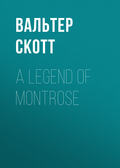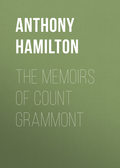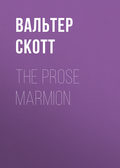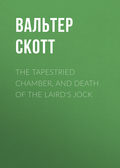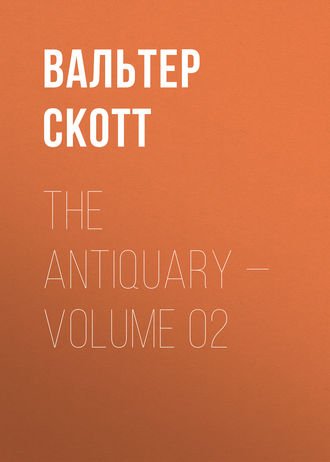
Вальтер Скотт
The Antiquary — Volume 02
CHAPTER TWENTY-FOURTH
Red glared the beacon on Pownell
On Skiddaw there were three;
The bugle horn on moor and fell
Was heard continually.
James Hogg.
The watch who kept his watch on the hill, and looked towards Birnam, probably conceived himself dreaming when he first beheld the fated grove put itself into motion for its march to Dunsinane. Even so old Caxon, as perched in his hut, he qualified his thoughts upon the approaching marriage of his daughter, and the dignity of being father-in-law to Lieutenant Taffril, with an occasional peep towards the signal-post with which his own corresponded, was not a little surprised by observing a light in that direction. He rubbed his eyes, looked again, adjusting his observation by a cross-staff which had been placed so as to bear upon the point. And behold, the light increased, like a comet to the eye of the astronomer, "with fear of change perplexing nations."
"The Lord preserve us!" said Caxon, "what's to be done now? But there will be wiser heads than mine to look to that, sae I'se e'en fire the beacon."
And he lighted the beacon accordingly, which threw up to the sky a long wavering train of light, startling the sea-fowl from their nests, and reflected far beneath by the reddening billows of the sea. The brother warders of Caxon being equally diligent, caught, and repeated his signal. The lights glanced on headlands and capes and inland hills, and the whole district was alarmed by the signal of invasion. 13
Our Antiquary, his head wrapped warm in two double night-caps, was quietly enjoying his repose, when it was suddenly broken by the screams of his sister, his niece, and two maid-servants.
"What the devil is the matter?" said he, starting up in his bed — "womankind in my room at this hour of night! — are ye all mad?"
"The beacon, uncle!" said Miss M'Intyre.
"The French coming to murder us!" screamed Miss Griselda.
"The beacon! the beacon! — the French! the French! — murder! murder! and waur than murder!" — cried the two handmaidens, like the chorus of an opera.
"The French?" said Oldbuck, starting up — "get out of the room, womankind that you are, till I get my things on — And hark ye, bring me my sword."
"Whilk o' them, Monkbarns?" cried his sister, offering a Roman falchion of brass with the one hand, and with the other an Andrea Ferrara without a handle.
"The langest, the langest," cried Jenny Rintherout, dragging in a two-handed sword of the twelfth century.
"Womankind," said Oldbuck in great agitation, "be composed, and do not give way to vain terror — Are you sure they are come?"
"Sure, sure!" exclaimed Jenny — "ower sure! — a' the sea fencibles, and the land fencibles, and the volunteers and yeomanry, are on fit, and driving to Fairport as hard as horse and man can gang — and auld Mucklebackit's gane wi' the lave — muckle gude he'll do! — Hech, sirs! —he'll be missed the morn wha wad hae served king and country weel!"
"Give me," said Oldbuck, "the sword which my father wore in the year forty-five — it hath no belt or baldrick — but we'll make shift."
So saying he thrust the weapon through the cover of his breeches pocket. At this moment Hector entered, who had been to a neighbouring height to ascertain whether the alarm was actual.
"Where are your arms, nephew?" exclaimed Oldbuck — "where is your double-barrelled gun, that was never out of your hand when there was no occasion for such vanities?"
"Pooh! pooh! sir," said Hector, "who ever took a fowling-piece on action? I have got my uniform on, you see — I hope I shall be of more use if they will give me a command than I could be with ten double-barrels. And you, sir, must get to Fairport, to give directions for quartering and maintaining the men and horses, and preventing confusion."
"You are right, Hector, — l believe I shall do as much with my head as my hand too. But here comes Sir Arthur Wardour, who, between ourselves, is not fit to accomplish much either one way or the other."
Sir Arthur was probably of a different opinion; for, dressed in his lieutenancy uniform, he was also on the road to Fairport, and called in his way to take Mr. Oldbuck with him, having had his original opinion of his sagacity much confirmed by late events. And in spite of all the entreaties of the womankind that the Antiquary would stay to garrison Monkbarns, Mr. Oldbuck, with his nephew, instantly accepted Sir Arthur's offer.
Those who have witnessed such a scene can alone conceive the state of bustle in Fairport. The windows were glancing with a hundred lights, which, appearing and disappearing rapidly, indicated the confusion within doors. The women of lower rank assembled and clamoured in the market-place. The yeomanry, pouring from their different glens, galloped through the streets, some individually, some in parties of five or six, as they had met on the road. The drums and fifes of the volunteers beating to arms, were blended with the voice of the officers, the sound of the bugles, and the tolling of the bells from the steeple. The ships in the harbour were lit up, and boats from the armed vessels added to the bustle, by landing men and guns destined to assist in the defence of the place. This part of the preparations was superintended by Taffril with much activity. Two or three light vessels had already slipped their cables and stood out to sea, in order to discover the supposed enemy.
Such was the scene of general confusion, when Sir Arthur Wardour, Oldbuck, and Hector, made their way with difficulty into the principal square, where the town-house is situated. It was lighted up, and the magistracy, with many of the neighbouring gentlemen, were assembled. And here, as upon other occasions of the like kind in Scotland, it was remarkable how the good sense and firmness of the people supplied almost all the deficiencies of inexperience.
The magistrates were beset by the quarter-masters of the different corps for billets for men and horses. "Let us," said Bailie Littlejohn, "take the horses into our warehouses, and the men into our parlours — share our supper with the one, and our forage with the other. We have made ourselves wealthy under a free and paternal government, and now is the time to show we know its value."
A loud and cheerful acquiescence was given by all present, and the substance of the wealthy, with the persons of those of all ranks, were unanimously devoted to the defence of the country.
Captain M'Intyre acted on this occasion as military adviser and aide-de-camp to the principal magistrate, and displayed a degree of presence of mind, and knowledge of his profession, totally unexpected by his uncle, who, recollecting his usual insouciance and impetuosity, gazed at him with astonishment from time to time, as he remarked the calm and steady manner in which he explained the various measures of precaution that his experience suggested, and gave directions for executing them. He found the different corps in good order, considering the irregular materials of which they were composed, in great force of numbers and high confidence and spirits. And so much did military experience at that moment overbalance all other claims to consequence, that even old Edie, instead of being left, like Diogenes at Sinope, to roll his tub when all around were preparing for defence, had the duty assigned him of superintending the serving out of the ammunition, which he executed with much discretion.
Two things were still anxiously expected — the presence of the Glenallan volunteers, who, in consideration of the importance of that family, had been formed into a separate corps, and the arrival of the officer before announced, to whom the measures of defence on that coast had been committed by the commander-in-chief, and whose commission would entitle him to take upon himself the full disposal of the military force.
At length the bugles of the Glenallan yeomanry were heard, and the Earl himself, to the surprise of all who knew his habits and state of health, appeared at their head in uniform. They formed a very handsome and well-mounted squadron, formed entirely out of the Earl's Lowland tenants, and were followed by a regiment of five hundred men, completely equipped in the Highland dress, whom he had brought down from the upland glens, with their pipes playing in the van. The clean and serviceable appearance of this band of feudal dependants called forth the admiration of Captain M'Intyre; but his uncle was still more struck by the manner in which, upon this crisis, the ancient military spirit of his house seemed to animate and invigorate the decayed frame of the Earl, their leader. He claimed, and obtained for himself and his followers, the post most likely to be that of danger, displayed great alacrity in making the necessary dispositions, and showed equal acuteness in discussing their propriety. Morning broke in upon the military councils of Fairport, while all concerned were still eagerly engaged in taking precautions for their defence.
At length a cry among the people announced, "There's the brave Major Neville come at last, with another officer;" and their post-chaise and four drove into the square, amidst the huzzas of the volunteers and inhabitants. The magistrates, with their assessors of the lieutenancy, hastened to the door of their town-house to receive him; but what was the surprise of all present, but most especially that of the Antiquary, when they became aware, that the handsome uniform and military cap disclosed the person and features of the pacific Lovel! A warm embrace, and a hearty shake of the hand, were necessary to assure him that his eyes were doing him justice. Sir Arthur was no less surprised to recognise his son, Captain Wardour, in Lovel's, or rather Major Neville's company. The first words of the young officers were a positive assurance to all present, that the courage and zeal which they had displayed were entirely thrown away, unless in so far as they afforded an acceptable proof of their spirit and promptitude.
"The watchman at Halket-head," said Major Neville, "as we discovered by an investigation which we made in our route hither, was most naturally misled by a bonfire which some idle people had made on the hill above Glenwithershins, just in the line of the beacon with which his corresponded."
Oldbuck gave a conscious look to Sir Arthur, who returned it with one equally sheepish, and a shrug of the shoulders,
"It must have been the machinery which we condemned to the flames in our wrath," said the Antiquary, plucking up heart, though not a little ashamed of having been the cause of so much disturbance — "The devil take Dousterswivel with all my heart! — I think he has bequeathed us a legacy of blunders and mischief, as if he had lighted some train of fireworks at his departure. I wonder what cracker will go off next among our shins. But yonder comes the prudent Caxon. — Hold up your head, you ass — your betters must bear the blame for you — And here, take this what-d'ye-call it" — (giving him his sword) — "I wonder what I would have said yesterday to any man that would have told me I was to stick such an appendage to my tail."
Here he found his arm gently pressed by Lord Glenallan, who dragged him into a separate apartment. "For God's sake, who is that young gentleman who is so strikingly like" —
"Like the unfortunate Eveline," interrupted Oldbuck. "I felt my heart warm to him from the first, and your lordship has suggested the very cause."
"But who — who is he?" continued Lord Glenallan, holding the Antiquary with a convulsive grasp.
"Formerly I would have called him Lovel, but now he turns out to be Major Neville."
"Whom my brother brought up as his natural son — whom he made his heir — Gracious Heaven! the child of my Eveline!"
"Hold, my lord — hold!" said Oldbuck, "do not give too hasty way to such a presumption; — what probability is there?"
"Probability? none! There is certainty! absolute certainty! The agent I mentioned to you wrote me the whole story — I received it yesterday, not sooner. Bring him, for God's sake, that a father's eyes may bless him before he departs."
"I will; but for your own sake and his, give him a few moments for preparation."
And, determined to make still farther investigation before yielding his entire conviction to so strange a tale, he sought out Major Neville, and found him expediting the necessary measures for dispersing the force which had been assembled.
"Pray, Major Neville, leave this business for a moment to Captain Wardour and to Hector, with whom, I hope, you are thoroughly reconciled" (Neville laughed, and shook hands with Hector across the table), "and grant me a moment's audience."
"You have a claim on me, Mr. Oldbuck, were my business more urgent," said Neville, "for having passed myself upon you under a false name, and rewarding your hospitality by injuring your nephew."
"You served him as he deserved," said Oldbuck — "though, by the way, he showed as much good sense as spirit to-day — Egad! if he would rub up his learning, and read Caesar and Polybus, and the Stratagemata Polyaeni, I think he would rise in the army — and I will certainly lend him a lift."
"He is heartily deserving of it," said Neville; "and I am glad you excuse me, which you may do the more frankly, when you know that I am so unfortunate as to have no better right to the name of Neville, by which I have been generally distinguished, than to that of Lovel, under which you knew me."
"Indeed! then, I trust, we shall find out one for you to which you shall have a firm and legal title."
"Sir! — I trust you do not think the misfortune of my birth a fit subject" —
"By no means, young man," answered the Antiquary, interrupting him; — "I believe I know more of your birth than you do yourself — and, to convince you of it, you were educated and known as a natural son of Geraldin Neville of Neville's-Burgh, in Yorkshire, and I presume, as his destined heir?"
"Pardon me — no such views were held out to me. I was liberally educated, and pushed forward in the army by money and interest; but I believe my supposed father long entertained some ideas of marriage, though he never carried them into effect."
"You say your supposed father? — What leads you to suppose Mr. Geraldin Neville was not your real father?"
"I know, Mr. Oldbuck, that you would not ask these questions on a point of such delicacy for the gratification of idle curiosity. I will therefore tell you candidly, that last year, while we occupied a small town in French Flanders, I found in a convent, near which I was quartered, a woman who spoke remarkably good English — She was a Spaniard — her name Teresa D'Acunha. In the process of our acquaintance, she discovered who I was, and made herself known to me as the person who had charge of my infancy. She dropped more than one hint of rank to which I was entitled, and of injustice done to me, promising a more full disclosure in case of the death of a lady in Scotland, during whose lifetime she was determined to keep the secret. She also intimated that Mr. Geraldin Neville was not my father. We were attacked by the enemy, and driven from the town, which was pillaged with savage ferocity by the republicans. The religious orders were the particular objects of their hate and cruelty. The convent was burned, and several nuns perished — among others Teresa; and with her all chance of knowing the story of my birth: tragic by all accounts it must have been."
"Raro antecedentem scelestum, or, as I may here say, scelestam," said Oldbuck, "deseruit poena— even Epicureans admitted that. And what did you do upon this?"
"I remonstrated with Mr. Neville by letter, and to no purpose. I then obtained leave of absence, and threw myself at his feet, conjuring him to complete the disclosure which Teresa had begun. He refused, and, on my importunity, indignantly upbraided me with the favours he had already conferred. I thought he abused the power of a benefactor, as he was compelled to admit he had no title to that of a father, and we parted in mutual displeasure. I renounced the name of Neville, and assumed that under which you knew me. It was at this time, when residing with a friend in the north of England who favoured my disguise, that I became acquainted with Miss Wardour, and was romantic enough to follow her to Scotland. My mind wavered on various plans of life, when I resolved to apply once more to Mr. Neville for an explanation of the mystery of my birth. It was long ere I received an answer; you were present when it was put into my hands. He informed me of his bad state of health, and conjured me, for my own sake, to inquire no farther into the nature of his connection with me, but to rest satisfied with his declaring it to be such and so intimate, that he designed to constitute me his heir. When I was preparing to leave Fairport to join him, a second express brought me word that he was no more. The possession of great wealth was unable to suppress the remorseful feelings with which I now regarded my conduct to my benefactor, and some hints in his letter appearing to intimate there was on my birth a deeper stain than that of ordinary illegitimacy, I remembered certain prejudices of Sir Arthur."
"And you brooded over these melancholy ideas until you were ill, instead of coming to me for advice, and telling me the whole story?" said Oldbuck.
"Exactly; then came my quarrel with Captain M'Intyre, and my compelled departure from Fairport and its vicinity."
"From love and from poetry — Miss Wardour and the Caledoniad?"
"Most true."
"And since that time you have been occupied, I suppose, with plans for Sir Arthur's relief?"
"Yes, sir; with the assistance of Captain Wardour at Edinburgh."
"And Edie Ochiltree here — you see I know the whole story. But how came you by the treasure?"
"It was a quantity of plate which had belonged to my uncle, and was left in the custody of a person at Fairport. Some time before his death he had sent orders that it should be melted down. He perhaps did not wish me to see the Glenallan arms upon it."
"Well, Major Neville — or let me say, Lovel, being the name in which I rather delight — you must, I believe, exchange both of your alias's for the style and title of the Honourable William Geraldin, commonly called Lord Geraldin."
The Antiquary then went through the strange and melancholy circumstances concerning his mother's death.
"I have no doubt," he said, "that your uncle wished the report to be believed, that the child of this unhappy marriage was no more — perhaps he might himself have an eye to the inheritance of his brother — he was then a gay wild young man — But of all intentions against your person, however much the evil conscience of Elspeth might lead her to inspect him from the agitation in which he appeared, Teresa's story and your own fully acquit him. And now, my dear sir, let me have the pleasure of introducing a son to a father."
We will not attempt to describe such a meeting. The proofs on all sides were found to be complete, for Mr. Neville had left a distinct account of the whole transaction with his confidential steward in a sealed packet, which was not to be opened until the death of the old Countess; his motive for preserving secrecy so long appearing to have been an apprehension of the effect which the discovery, fraught with so much disgrace, must necessarily produce upon her haughty and violent temper.
In the evening of that day, the yeomanry and volunteers of Glenallan drank prosperity to their young master. In a month afterwards Lord Geraldin was married to Miss Wardour, the Antiquary making the lady a present of the wedding ring — a massy circle of antique chasing, bearing the motto of Aldobrand Oldenbuck, Kunst macht gunst.
Old Edie, the most important man that ever wore a blue gown, bowls away easily from one friend's house to another, and boasts that he never travels unless on a sunny day. Latterly, indeed, he has given some symptoms of becoming stationary, being frequently found in the corner of a snug cottage between Monkbarns and Knockwinnock, to which Caxon retreated upon his daughter's marriage, in order to be in the neighbourhood of the three parochial wigs, which he continues to keep in repair, though only for amusement. Edie has been heard to say, "This is a gey bein place, and it's a comfort to hae sic a corner to sit in in a bad day." It is thought, as he grows stiffer in the joints, he will finally settle there.
The bounty of such wealthy patrons as Lord and Lady Geraldin flowed copiously upon Mrs. Hadoway and upon the Mucklebackits. By the former it was well employed, by the latter wasted. They continue, however, to receive it, but under the administration of Edie Ochiltree; and they do not accept it without grumbling at the channel through which it is conveyed.
Hector is rising rapidly in the army, and has been more than once mentioned in the Gazette, and rises proportionally high in his uncle's favour; and what scarcely pleases the young soldier less, he has also shot two seals, and thus put an end to the Antiquary's perpetual harping upon the story of the phoca.People talk of a marriage between Miss M'Intyre and Captain Wardour; but this wants confirmation.
The Antiquary is a frequent visitor at Knockwinnock and Glenallan House, ostensibly for the sake of completing two essays, one on the mail-shirt of the Great Earl, and the other on the left-hand gauntlet of Hell-in-Harness. He regularly inquires whether Lord Geraldin has commenced the Caledoniad, and shakes his head at the answers he receives.En attendant, however, he has completed his notes, which, we believe, will be at the service of any one who chooses to make them public without risk or expense to THE ANTIQUARY.



